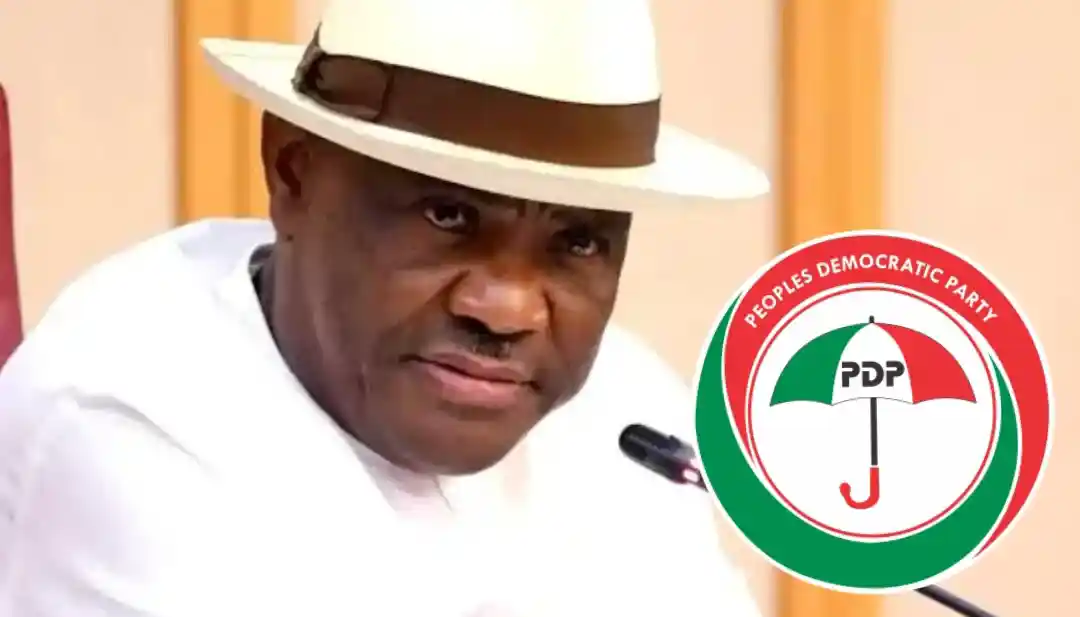PDP Crisis Deepens: Wike Withdraws from Reconciliation Talks, Accuses Makinde of Betrayal
- Advertisement -
The internal crisis within the Peoples Democratic Party (PDP) took a dramatic turn on Sunday, May 25, 2025, as the Minister of the Federal Capital Territory, Nyesom Ezenwo Wike, officially pulled out of all reconciliation efforts within the party. In a strongly-worded statement, Wike accused Oyo State Governor, Seyi Makinde, of sabotaging internal peace processes and violating previously agreed resolutions.
This new development threatens to further destabilize the PDP, which has been embroiled in persistent leadership disputes and factional battles since the 2023 general elections.
Wike’s Shocking Exit from Reconciliation Deal
In a personal statement titled “PDP Crisis: My Position,” Wike expressed deep frustration over what he described as serial betrayal, dishonesty, and deliberate violations of trust by key PDP figures. Among those singled out were Governor Makinde and Enugu State Governor Peter Mbah.
- Advertisement -
“I made it clear to the Governor of Oyo State, HE Seyi Makinde, that he was the architect of our problems, pointing out to him that non-adherence to agreements reached was the bane of the party,” Wike wrote.
The former Rivers State Governor noted that despite earlier resolutions to mend fences, fresh breaches—including an aborted PDP Zonal Congress in Jos—had made continued reconciliation efforts untenable.
Also Read : Is Tinubu Behind the Crisis in Labour Party, PDP? Here is What Peter Obi Said
- Advertisement -
Details of the Agreements and Alleged Violations
According to Wike, several key meetings were held to address PDP’s internal rifts. These included:
- G5 Meeting in Lagos: Wike alleged that he pointedly told Makinde he was sabotaging unity efforts.
- Expanded Abuja Meeting: Attended by PDP leaders including Bala Mohammed, Umaru Fintiri, Bukola Saraki, and others. A series of resolutions were reportedly adopted:
- Senator Samuel Anyanwu to remain National Secretary in line with Supreme Court judgment.
- Withdrawal of legal actions related to Rivers State.
- Suspension of state-of-emergency suit.
- Strict adherence to the agreed framework.
Despite these measures, Wike alleged that Makinde and Mbah violated the terms by:
- Attempting to impose Ude Okoye as National Secretary through a South-East caucus.
- Instructing party officials to issue unauthorized letters, bypassing Senator Anyanwu.
- Forcing a controversial NEC meeting not backed by legitimate party authorities.
These actions, according to Wike, directly led to INEC’s rejection of the Jos congress and escalating tensions within the party’s national structure.
- Advertisement -
Historical Context: PDP’s Post-2023 Electoral Troubles
Wike traced the root of the PDP’s implosion to the aftermath of the 2023 general elections, where the party lost its grip on national power and witnessed rising internal strife.
“Since after the 2023 general election, the PDP has been wantonly swinging from one part of a slippery precipice to another, owing fundamentally to dishonesty and lack of trust amongst its key stakeholders,” he lamented.
Wike emphasized his long-standing commitment to the party since 1998, stating that no other current party leader has sacrificed as much for the PDP’s survival.
Wike’s Decision: A Turning Point for PDP?
The FCT Minister, who played a pivotal role in the emergence of the G5 governors’ bloc during the 2023 election cycle, declared he would no longer honor agreements within the party, citing bad faith by fellow stakeholders.
“Since it is now obvious that they would continue to play games to the detriment of the party… I have now firmly decided to pull out of all agreements hitherto reached. I have decided to fight on until justice is attained,” he concluded.
Reactions and Implications
While other G5 members have yet to comment publicly on the latest fallout, political analysts warn that the implications could be dire for PDP’s 2027 prospects, especially in zones where Wike’s influence is considerable.
- Advertisement -
Observers believe this renewed confrontation may:
- Undermine upcoming PDP congresses and primaries.
- Deepen factionalism across state chapters.
- Spark defection rumors ahead of 2027.
What This Means for PDP’s National Unity
Wike’s decision to make his grievances public reflects a deepening rift within the PDP hierarchy, one that could result in further fragmentation if not immediately addressed.
Governor Seyi Makinde, who is yet to issue an official response, remains a central figure in the drama—one accused of violating internal party rules and backing unconstitutional leadership changes.
Unless urgent interventions are made, PDP risks entering the 2027 electoral season as a divided and weakened opposition, unable to present a unified front against the ruling All Progressives Congress (APC).
Editor’s Note
The latest escalation in the PDP crisis—spearheaded by Wike’s withdrawal from reconciliation talks and public condemnation of Governor Makinde—signals a critical moment for the party’s leadership.
For Nigeria’s political observers, stakeholders, and party faithful, the coming weeks will be crucial in determining whether the PDP can repair its broken alliances or collapse further into internal chaos.
- Advertisement -


